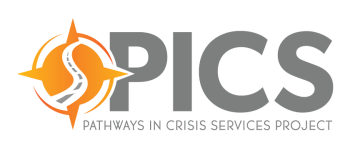
A Roadmap to Crisis-Based Services
The Pathways in Crisis Services (PICS) Project provides academic courses and professional learning events and content focused on evidence-based crisis programs that include crisis intervention, de-escalation services, mobile crisis and crisis stabilization for Pre-service (students) and Practicing Behavioral Health Professionals with the goal of increasing knowledge and skills leading to use in practice.
This is accomplished by guaranteeing college students get exposure to crisis intervention services and skills to prepare them to do crisis intervention services which include: risk determination; early intervention; de-escalation strategies; how to conduct warm-hand-off; and understanding the new (988) system through the development of curriculum infusion and training. Practicing Professionals will have the opportunity to focus on a variety of training and technical assistance (T/TA) events to ensure that T/TA in crisis-based programs is available to help prepare these professionals with the knowledge and skills to provide crisis-based services.
Educators
The Educators section of the PICS project provides a roadmap on the use of curriculum infusion (CI) and includes a variety of slide decks on Crisis Response, Suicide Prevention, Trauma, Compassion Fatigue, Cultural Considerations, and other topics related to crisis support services. The CIs include videos, classroom exercises, case studies, and a guideline on infusing the slide decks into existing material. These slide decks can be used in class or training/in-service events or can be downloaded prior to class or a training event. Lastly, each slide deck includes full presenter/trainer notes and references.
Practicing Professionals
The Practicing Professionals section of the PICS project is dedicated to practicing and provides T/TA and resources in crisis-based services that are focused on different evidence-based crisis-based programs/interventions in different disciplines. This section includes links to digital and printable downloads, Blogs, self-paced online courses, and videos. Topics include and are not limited to: 1) overview of crisis-based programs; 2) mobile crisis; and 3) de-escalation strategies. Many resources are offered in both English and Spanish in multiple formats.
PICS is a Partnership between



If you require further information, please do not hesitate to contact The Center for the Application of Substance Abuse Technologies (CASAT). Individuals are free to use these slides and pictures, but please give credit to the Pathways in Crisis Services Project (PICS) when using them at the beginning of your presentation.
Funding for this product was made possible in whole or in part by the Nevada Division of Public and Behavioral Health Bureau of Behavioral Health, Prevention, and Wellness (DHHS). The views expressed in these materials do not necessarily reflect the official policies or views of
DHHS or the State of Nevada nor does mention of trade names, commercial practices, or organizations imply endorsement by the U.S. Government or the State.
